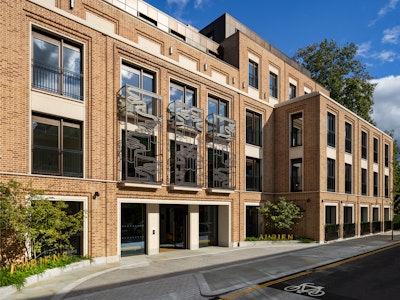As Seen in the Telegraph: Life at Auriens Chelsea

It seemed too soon for Liz Greetham and her husband, Chris, to be packing up their five-storey Chelsea townhouse and downsizing to an apartment in an assisted-living community. They didn’t need nursing or help with the shopping; they could walk to Waitrose and were still bounding up the stairs at home – Liz’s bathroom was at the top of the house with panoramic views over Chelsea.
Yet despite Liz being in her early 70s and Chris in his mid-70s, both were certain that they didn’t want to wait until it was too late to move somewhere with the infrastructure to support them as they aged. So, in 2022, they sent the majority of their furniture and paintings to auction and moved to a two-bedroom apartment in Auriens, Britain’s most luxurious retirement community.
“We’re quite forward-thinking having lived in the States, where this way of life is pretty common,” says Liz, who is now 75 and used to work on Wall Street in New York.
Situated on a quiet street, just six minutes’ walk down the King’s Road from Liz’s former house, Auriens offers a gold-standard quality of life to wealthy over-65s: there are 56 luxurious apartments, concierge, pool, gym, spa and access to nursing.
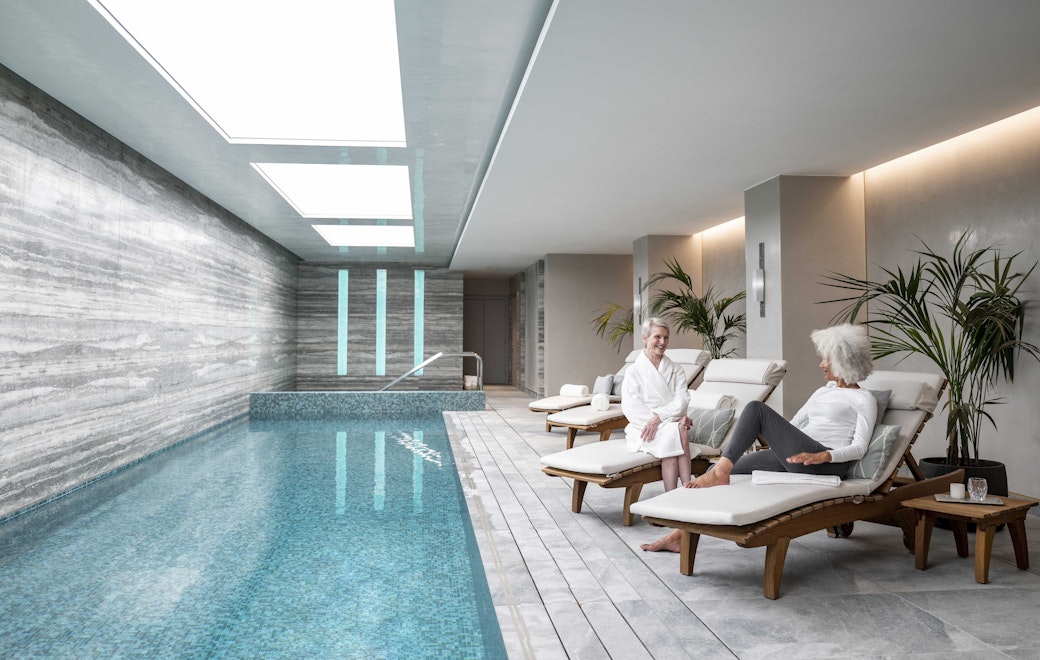
Residents don’t go there to grow old, but to live longer, explains Henry Lumby, commercial officer. “Everything we offer here is designed to promote independence,” he says. “We’re creating a Blue Zone to maximise longevity. These are very successful people and they want to stay stimulated and relevant.”
I’ve come to spend the day here at Auriens to experience life in a luxury retirement community. Demand for homes in IRCs – integrated retirement communities – such as Auriens is rocketing, with the sector growing by 39 per cent since 2022. Chelsea, one of London’s richest neighbourhoods, was in urgent need of a super luxury IRC as it has a higher proportion of over 65s than other boroughs, and is something of a Blue Zone itself: women tend to live four years longer than the UK average of 82.6.
Since launching last year, more than 60 per cent of the apartments have been snapped up despite costing from £2.75 million. As Lumby points out, just because residents are richer does not mean their need for support and stimulation as they age is any less great.
While there’s no jigsaw room at Auriens as there is at Coopers Chase, the fictional later-life community in Thursday Murder Club, the new film based on Richard Osman’s novel where residents meet for amateur detective work, life is as busy and social as you want it to be, Liz says. As we pass through the lobby, designed by Albion Nord, she points to the events board listing this month’s itinerary of talks, concerts, films and dining experiences. There’s a library, a cinema, a fine-dining restaurant and a speakeasy bar that is often buzzing past midnight. “I still see my local friends, but it’s fun to meet new people and hear their stories about what they’ve done with their life,” Liz tells me.
The residents’ high jinks was what impressed Richard Osman when he visited a later-life community in Kent before writing his book. “I loved the friendships I witnessed, and the mischievous nature of many of the residents,” he says. “So much laughter, so much wine and so much wisdom. It was a beguiling mix which I wanted to show to the world.”
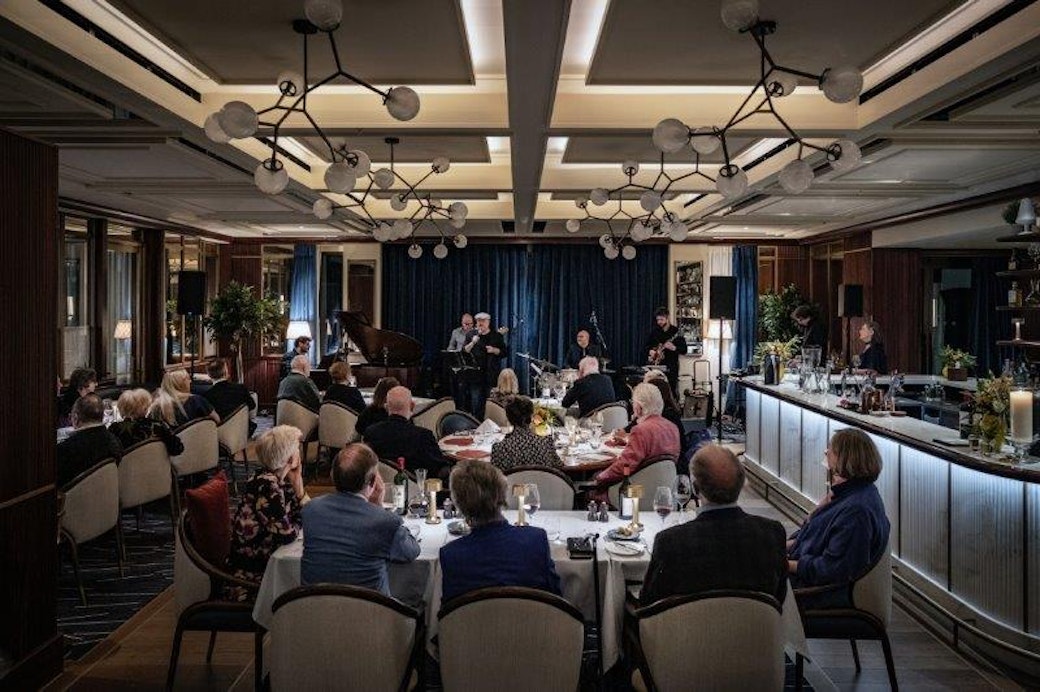
A social life on your doorstep
It’s nearly lunchtime and the lobby at Auriens is bustling with glamorous pensioners heading out to local restaurants. Others are returning with shopping bags or in their sportswear. Liz and her husband, who also lived and worked in Bermuda for many years, have met plenty of kindred spirits; the other residents are an eclectic mix of successful businessmen and entrepreneurs, Liz says; they’re interesting and interested. “They might be incredibly British, but they’re outward looking,” she says. “They’re good at making decisions and have learnt to let go.”
While she doesn’t join the weekly art and singing classes, many of her friends do. I count at least eight canvases drying on the table in the studio, and in the library a concert pianist is playing Chopin on the baby grand. Liz has been to a concert or recital almost every week since moving to Auriens. Does she ever get sick of socialising? “No – there’s no pressure. I like the way the community is inclusive,” she says. “Here, it doesn’t get to 6pm and all your friends disappear into married life. One of my single friends told me that she’s never bored in the evening any more.”
Data from Age UK suggests that nearly a million older people in the UK are often lonely, yet in IRCs they are happier and more active with a greater sense of security, according to a study by ARCO (Associated Retirement Community Operators).
“People are looking for fun and excitement – they want to live their best lives as they get older,” says Paul Morgan, co-founder and CEO of Wallacea Living, a luxury IRC developer soon to open a community in Marylebone. “Moving to an IRC within their community gives them the option to carry on with their lives in a proactive way and stay connected to their network of friends.”
While Liz has no use for the 12-place dinner service loitering in her kitchen cupboard – 12 people wouldn’t fit into her apartment – she and Chris regularly host small dinner parties. Their apartment is light-filled and furnished to their taste, with a spacious spare bedroom suite for guests and a fully-equipped kitchen.
On a tour of the show apartment, however, Lumby alerts me to the various hidden design elements which promote independence: strategically positioned chrome handles in the bathrooms; arthritis-friendly taps and, in the kitchen, pull-out surfaces which can be used for seated food preparation and cupboards that move up and down electronically, ensuring residents can always reach the top shelf. Even the lighting systems, designed to help with residents’ circadian rhythms, are easy to operate, with a series of automatic night lights to help prevent falls at night.
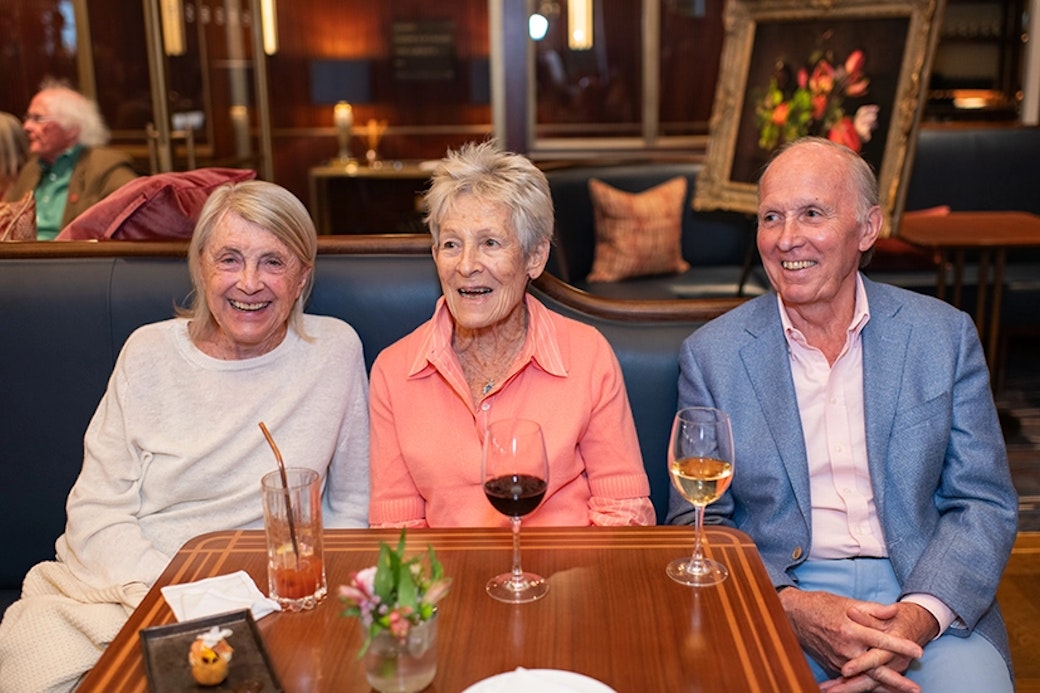
Luxury living with everyday ease
The whole point of an IRC is that you don’t have to worry about life admin any more, Lumby explains. There are staff on hand to carry shopping, collect rubbish, book doctor’s appointments and sort out your iPad when it malfunctions. There’s also a house Range Rover to drop residents at the dentist – Liz and Chris have got rid of their car.
The only service Liz hasn’t embraced is the beauty salon, which offers manicures and pedicures as well as hairdressing. The prices just aren’t competitive as they are on the King’s Road, she says. Other residents clearly feel the same as the salon is empty when I walk past.
The menu at the restaurant is tailored to the nutritional needs of over-65s, but it isn’t exactly full, either, as Lumby and I sample the protein-rich lobster linguine. Residents like to head off into Chelsea or do their own thing at home during the week, he says, yet many opt to dine there at breakfast, returning to the same tables like commuters, and at weekends it’s lively with residents’ grandchildren coming in for spaghetti bolognaise.
Families are encouraged to be part of the community at Auriens – there are even guest suites for them to rent on a nightly rate for longer stays and a Sunday swimming session for grandchildren. Liz’s two children, who both have their own families and live across the river in Barnes and Wandsworth, visit regularly – but not too regularly, she says. “I wouldn’t want to move in with them. I like being independent and they’ve got their own lives. But it’s great having them close.”
Her goal for this month is to make sure she can lift her 15-month-old grandson when he comes to visit. “I’m currently working on a strength-building programme in the gym for when he runs at me,” she tells me. The gym has been an unexpected addition to her life since moving to Auriens. She never used to work out, but now she trains several times a week with trainers from the Kyros Project, who specialise in Pilates, yoga, physiotherapy and chiropractic care. Residents also have a dietician to help them plan nutritionally-balanced meals.
“The trainers work on the basis that as you grow older you lose muscle mass – if you look at our stats, that is not the case. I’ve got more muscle mass now than when I arrived. One of the guys who worked with Ben Ainsley now looks out for little me,” she says.
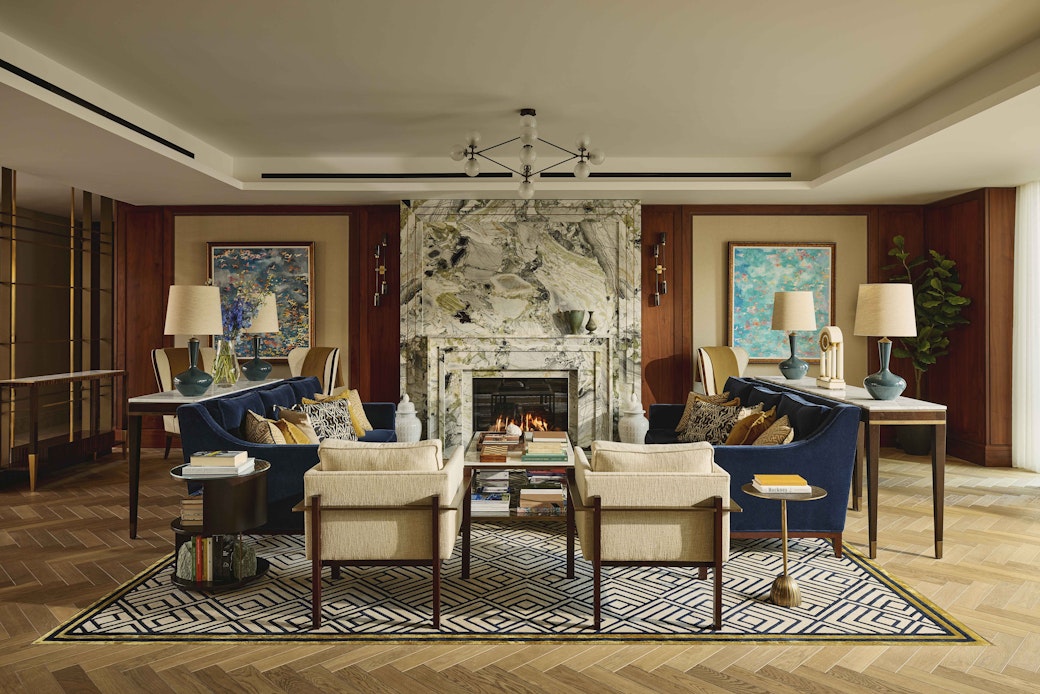
Staying strong and independent
Studies show that more than 70 per cent of those living in IRCs either maintain or improve their health, as well as feeling less lonely. In the States, where the concept is established, potential purchasers put their names down for their local IRC while still in their fifties to ensure they get a space.
The British, however, are taking some convincing; either they wait until they’ve had a decline in health or mobility to move to an IRC, or they opt to pay for a carer at home, which is a cheaper solution. “It’s not part of the British psyche. We tend to hang on to our family homes and leave it to the kids to sort everything out when it goes wrong,” agrees Liz. “Yet I wouldn’t want my children trawling through my things. It’s better to get everything sorted first.”
Karen Maxwell, whose mother moved to a rented apartment in Audley Nightingale Place, an upmarket IRC overlooking Clapham Common in south-west London this spring, wishes she’d made the move sooner. After breaking her hip, her mother was stranded in her own home. “Audley is a buzzy, intellectual community where she can be independent with help on hand. It’s also massively nice for me as she can press a buzzer and someone will come immediately. I can sleep knowing she won’t be left on the floor.”
Last year, when Liz’s health took a turn for the worse – she had back surgery for scoliosis and spine compression – she was relieved she hadn’t waited any longer to move to Auriens. “I nearly wasn’t here; the kids were called in to say goodbye,” she says. “When I came back from hospital, I had night nurses and day nurses and chefs to cook and trainers to make me lift my legs while I lay in bed. I recovered. They supported me but they never fussed, which I think is key.”
Both Lumby and Morgan are convinced that IRCs are a solution across all demographics for both the social care crisis, which is bankrupting councils, and the housing crisis – they free up family homes. Residents can stay at their IRC for the rest of their lives, unless they suffer from late stage dementia, in which case they will move to a designated dementia facility (their luxury care home market is also flourishing).
“We need to be providing more communities like this for the lower- and mid-market,” Morgan says. “If they’re created on a larger scale, there is no reason why they can’t have the same facilities.” Indeed, the Extra Care Charitable Trust operates 20 retirement villages in the Midlands and further south, with properties available through help to buy schemes.

Confidence in the retirement housing sector has not been helped by opaque lease terms and resale losses at certain developments; a report this year found that 59 per cent of McCarthy Stone flats built between 2010 and 2019 sold at a loss – in the worst cases losing up to 88 per cent in value. Yet Morgan is keen to point out that upmarket IRCs such as Auriens and Wallacea Living cannot be compared to other forms of retirement housing.
They are accredited by ARCO, a consumer code which demands transparency in all aspects of the purchase and future resale. Resale values track above house price inflation, according to data from Knight Frank, and the average property takes three to four months to resell.
For a community such as Auriens, a danger must be that residents will live so long that they run out of money to pay for care. Liz jokes that once they’d set their heart on Auriens, they had to work out how long they could live there until they went bust. After all, her own mother is still going strong at 98, and lives in Buckinghamshire. Yet after three years she cannot think of a better way to invest their hard-earned savings.
“We’re keeping our independence for as long as possible, which is what matters,” she says. “I like living somewhere that makes me feel good about getting old.”
Find Us
2 Dovehouse Street
London, SW3 6BF
020 4549 8000
Auriens is a member of ARCO, which represents Integrated Retirement Communities in Great Britain. As an ‘Approved Operator’, Auriens aims to comply at all times with the requirements of the ARCO Consumer Code.

